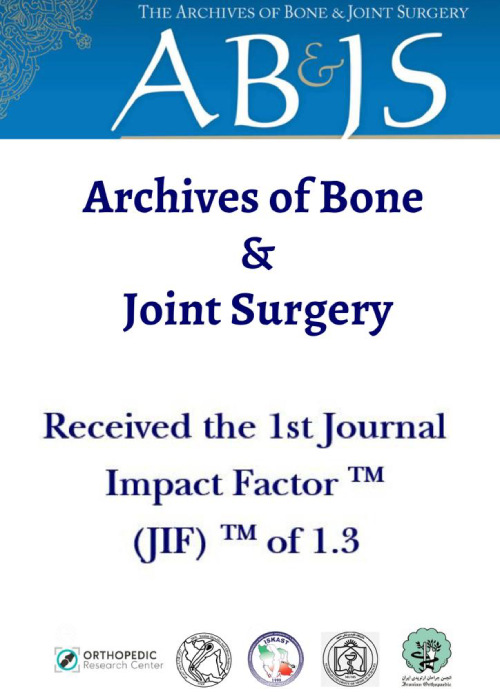Which Pre-Operative, Modifiable Risk Factors are Most Predictive of Complications in orthopedic Upper Extremity Surgery?
Author(s):
Article Type:
Research/Original Article (دارای رتبه معتبر)
Abstract:
Objectives
Identification of modifiable comorbid conditions in the preoperative period is important in optimizing outcomes. We evaluate the association between such risk factors and postoperative outcomes after upper extremity surgery using a national database.Methods
The National Surgical Quality Improvement Program (NSQIP) 2006-2016 database was used to identify patients undergoing an upper extremity principle surgical procedure using CPT codes. Modifiable risk factors were defined as smoking status, use of alcohol, obesity, recent loss of >10% body weight, malnutrition, and anemia. Outcomes included discharge destination, major complications, bleeding complications, unplanned re-operation, sepsis, and prolonged length of stay. Chi square and multivariable logistic regressions were used to identify significant predictors of outcomes. Significance was defined as P<0.01.Results
After applying exclusion criteria, 53,780 patients were included in the final analysis. Preoperative malnutrition was significantly associated with non-routine discharge (OR=4.75), major complications (OR=7.27), bleeding complications (OR=7.43), unplanned re-operation (OR=2.44), sepsis (OR=10.22), and prolonged length of stay (OR=5.27). Anemia was associated with non-routine discharge (OR=2.67), bleeding complications (OR=13.27), and prolonged length of stay (OR=3.26). In patients who had a weight loss of greater than 10%, there was an increase of non-routine discharge (OR=2.77), major complications (OR=2.93), and sepsis (OR=3.7). Smoking, alcohol use, and obesity were not associated with these complications.Conclusion
Behavioral risk factors (smoking, alcohol use, and obesity) were not associated with increased complication rates. Malnutrition, weight loss, and anemia were associated with an increase in postoperative complication rates in patients undergoing upper limb orthopaedic procedures and should be addressed prior to surgery, suggesting nutrition labs should be part of the initial blood work. Level of evidence: IIIKeywords:
Language:
English
Published:
Archives of Bone and Joint Surgery, Volume:12 Issue: 4, Apr 2024
Pages:
234 to 239
magiran.com/p2701488
دانلود و مطالعه متن این مقاله با یکی از روشهای زیر امکان پذیر است:
اشتراک شخصی
با عضویت و پرداخت آنلاین حق اشتراک یکساله به مبلغ 1,390,000ريال میتوانید 70 عنوان مطلب دانلود کنید!
اشتراک سازمانی
به کتابخانه دانشگاه یا محل کار خود پیشنهاد کنید تا اشتراک سازمانی این پایگاه را برای دسترسی نامحدود همه کاربران به متن مطالب تهیه نمایند!
توجه!
- حق عضویت دریافتی صرف حمایت از نشریات عضو و نگهداری، تکمیل و توسعه مگیران میشود.
- پرداخت حق اشتراک و دانلود مقالات اجازه بازنشر آن در سایر رسانههای چاپی و دیجیتال را به کاربر نمیدهد.
In order to view content subscription is required
Personal subscription
Subscribe magiran.com for 70 € euros via PayPal and download 70 articles during a year.
Organization subscription
Please contact us to subscribe your university or library for unlimited access!


